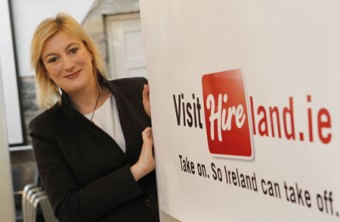‘Good news from the Cloud’
Microsoft Ireland is to expand the Dublin data centre

Microsoft’s cloud services include its online gaming platform Xbox Live.
Microsoft is to expand its data centre in Dublin, investing an additional $130 million in the facility.
The Dublin-based data centre, which began operation in 2009 with an initial investment of $500 million, will grow to 415,000 sq ft and 29.4 megawatts. Initially, the centre was 303,000 sq ft.
The centre currently provides computing capacity to customers across Europe, the Middle East and Africa. It was the first Microsoft mega data centre built outside of the US, and was designed to support the company’s cloud services.
“This investment shows where we are placing our bets for the future. As customers embrace Microsoft cloud services such as Office 365, Windows Live, Xbox Live, Bing and the Windows Azure platform, we are investing in regional cloud infrastructure to meet their needs,” said Microsoft’s chief financial officer Peter Klein.
“As we expand our Dublin data centre, we remain committed to efficiency and sustainability. Our expanded facility will be 50 per cent more efficient than traditional data centres, and will use renewable wind energy when available.”
Taoiseach Enda Kenny welcomed the investment.
“Now central to our Action Plan on Jobs we are delighted that our strategy to become the country of choice for data centres is coming to fruition,” he said.
“We very much recognise the role that cloud computing can play in transforming our public sector as well as being a catalyst for economic growth.”
Although the data centre itself won’t directly create a large number of new jobs – the expanded centre will employ between 50 and 70 people in total – it is expected to create 400 construction jobs over the next 12 months.
Research warning over paediatric hospitals “Irish children on trolleys for up to 24 hours”


Recent research shows that ‘not infrequently’ children are spending longer than 12 hours on a trolley and in some cases more than 24 hours.
Quality of care is being adversely affected in the country’s paediatric emergency departments with children being forced to stay on trolleys in corridors for 24 hours in some cases, the Irish Association for Emergency Medicine (IAEM) warned today.
The association said there has been “significantly worsening” overcrowding at Temple Street and Our Lady’s Hospital in Crumlin this winter and it is now at “historically high and dangerous levels”.
However, it said the problem of overcrowding is not due to an increase in demand for services as data show admission rates remain at a steady rate.
The association said an increase of 700 per cent in the number of children on trolleys at Our Lady’s Hospital in Crumlin has been recorded by clinicians over the last three years. An increase has also been recorded in the number of children leaving the hospital without receiving treatment
Speaking this morning, Prof Ronan O’Sullivan, a consultant in emergency medicine in Crumlin, said overcrowding was an “escalating problem” which is as bad now as in many adult emergency departments.
The real reason for overcrowding was a lack of access to inpatient beds. “There’s been significant cuts in beds in the paediatric hospitals – and that’s the primary reason for this,” he told RTÉ’s Morning Ireland .
Prof O’Sullivan said short-term measures to tackle seasonal problems such as flu and respiratory infections would go some way in tackling the problem.
A recent surge in respiratory infections which has increased pressure on services at paediatric departments was “eminently predictable”, Prof O’Sullivan said. “These are short term illnesses and they benefit from short-term admissions.
“It’s a lack of isolation facilities for things like the flu, for respiratory illnesses that we don’t have and, in actual fact, a bit of lateral thinking in relation to how we admit children will actually help. An increase in short-stay unit admissions would be particularly helpful.”
The IAEM has outlined a number of “immediate and cost-effective” measures is said would alleviate the problem of overcrowding.
They include the reopening of hospital beds in hospitals for a short (but predictable) period each winter to accommodate increased demand for short-term care of children with infectious disease, resourcing the development of ‘observation medicine’ and clinical decision units to accommodate these patients, and the incorporation of performance measures from paediatric emergency departments into a national data set for consideration when formulating solutions to overcrowding.
“What we’re looking for is some lateral thinking in relation to reopening some beds – not opening all beds all of the time but opening some beds for an adequate amount of time during the winter,” Prof O’Sullivan said.
“If the system could be resourced to develop short-stay units- and that is a relatively low capital cost – if the system could be resourced to do that then there’s excellent evidence there that that’s a cost-effective and efficient way of admitting patients and in particular, children.”
Galway University Hospitals (GUH) hospitals become smoke-free zones
From yesterday Wednesday the 22nd, Galway University Hospitals (GUH) has introduced a smoke free campus policy on National No Smoking Day which means that patients and visitors will no longer be allowed to smoke in areas near the entrance and must leave the grounds to do so.
The new rules prohibit smoking on the hospital grounds, for example entrances, doorways, walkways, internal roads, bus shelters, car parks, cars, bicycle shelters, etc. This policy will apply to the Merlin Park University Hospital and the University Hospital Galway sites.
As a leading healthcare provide, GUH is committed to reducing the use of tobacco and its harmful health effects. GUH aims to create a healthier, smoke free, clean environment for its patients, staff, and visitors in line with GUH’s status as a health promoting hospital, a smoke-free hospital and its designation as one of the eight regional cancer centres in Ireland.
The policy will apply to all staff, patients, visitors, contractors, and anyone who enters the hospital buildings/grounds.
Dr Paul Donnellan, consultant medical oncologist, GUH says: “Lung cancer is the commonest cause of cancer death in men and women. In fact lung cancer kills more people than do the next three common cancers combined. Yet lung cancer is almost entirely preventable.
“About 1,650 people in Ireland die from lung cancer every year. Smoking cigarettes is by far the biggest risk factor and is responsible for 90 percent of cases. There are over 4,000 chemicals in every cigarette and at least 55 are known to cause cancer.”
“The risk of developing lung cancer is also dose dependent. For example, if you smoke just one cigarette a day, you are three times more likely to get lung cancer than a non-smoker. However if you smoke more than 20 cigarettes a day, you are 20 times more likely to get lung cancer than a non-smoker.
“Even if you do not smoke, frequent exposure to other people’s tobacco smoke, so called ‘passive smoking’ but what I prefer to call ‘involuntarily inhaled second-hand smoke’ can increase your risk of developing lung cancer. Research has found that non-smoking women who share their house with a smoking partner are 27 percent more likely to develop lung cancer than non-smoking women who live with a non-smoking partner.
“The HSE has set a target of introducing a smoke free campus policy to all health campuses by 2015 and we are introducing this policy in GUH on Wednesday. The HSE has also developed a QUIT campaign to provide supports for people who want to quit smoking. In GUH we will be supporting patients to help them quit smoking or to manage their addiction during their hospital stay.”
Dr Donnellan concluded: “I urge all doctors and allied health care workers to support the smoke-free campus initiative and join with us in sending a clear, strong, and unambiguous anti-smoking message.”
Tony Canavan, chief operating officer of the Galway, Roscommon Hospital Group says,: “The smoke free campus policy will lead to a better health outcome for patients by treating tobacco addiction as a care issue and we will be actively promoting smoking cessation to support patients to quit.
“The introduction of a smoke free campus policy will take time but the success of this type of policy in other hospitals – St Vincent’s University Hospital, Connolly Hospital Blanchardstown, Mater Misericordiae University Hospital, and Cork University Hospital – along with the positive feedback from a survey of patients and staff indicates that the majority of people support the policy.”
Galway placed second in Hireland league of 105 new jobs pledged
Hireland founder Lucy Masterson left. Although the majority of Hireland (1,882) of the jobs are located in Dublin, the pledges are not confined to the capital. A total of 24 counties are represented, with 85 jobs pledged in Kildare, 72 in Mayo and 105 in Galway.
Companies in Galway have promised to create 105 jobs — the highest number of jobs pledged in the country outside Dublin — under the recently launched Hireland initiative.
Hireland announced this week that, just over one month after the job creation initiative was launched, more than 2,500 jobs have been pledged around the country, and 150 people have already starting working in promised new posts. The campaign initially aimed to encourage companies to pledge 5,000 new jobs within six months.
Launched just over one month ago, Hireland this week confirmed that the initiative has already received over 2,500 job pledges from businesses all over the country. This is all the more impressive as Hireland had set a six month target of 5,000 pledges and is now at the halfway point after little more than a month.
As of today, 589 companies have pledged jobs across a wide range of sectors from software design and development to engineering and pharmaceuticals to sales, marketing,retail, hotel, hospitality and sports leisure.
Furthermore, there has been a swift translation from pledges to jobs with 150 having commenced jobs already that were pledged on Hireland.ie These jobs are in a variety of companies in Ireland including; ely Winebar, Hauste Group, Spirit Motor Group, Red Tree Consulting, Byrne Curtin Kelly and Murex Advanced Technologies.
Speaking after her appearance in RTE’s The Frontline this week, Lucy Masterson, co-founder of Hireland commented, “We cannot get over the immense goodwill and positivity that Hireland is generating! We are barely one month in and we have already passed the halfway point in terms of pledges. We started this initiative to help generate positivity amidst the doom and gloom and there is no better way to beat the doom and gloom than by helping to put people in jobs. Over 150 people have already started in new jobs. This is a really encouraging sign and one that we hope will continue.”
By recruiting more people into the business, a company will experience immediate and direct benefits. It lets customers know they can expect a better service, staff will be rewarded with a greater division of labour and enhanced output and it also sends a strong message to competitors by investing in the business.
Hireland is a volunteer, not-for-profit group that has developed a national communications initiative to encourage employers to hire one of the thousands of skilled people who are currently out of work. It came about in February 2011 after a kitchen table conversation bya group of friends, who had lost other friends to emigration. Since then, it has grown to include students, and people from the business, marketing and media community, all of whom have given their time and skills for free simply because they want to see the creation of jobs for the thousands of unemployed skilled workers in Ireland.
Hireland wants to draw on the power of the collective and act as a catalyst to stimulate job creation. It’s about a positive, confident movement, where one job will lead to another if Irish businesses get on board and pledge a job.
Ireland’s media industry has played a big part in supporting Hireland and has given €500,000 in advertising to support the launch of the initiative. Hireland’s campaign includes newspaper, television, radio and outdoor advertising, as well as digital and PR activity.
Even though Hireland only officially launched last month, it has already inspired a sister initiative in the United States of America, UhireU.S. which was announced at the Clinton Global Initiative in New York in September 2011.
A sure way of future proofing a business is to hire more people, so business owners are asked to log on to www.hireland.ie and pledge a job today.



No comments:
Post a Comment